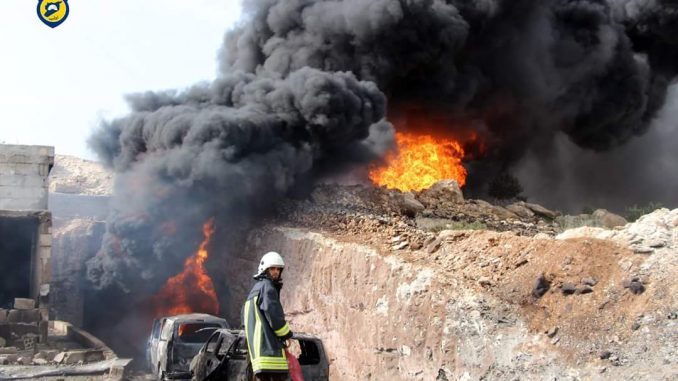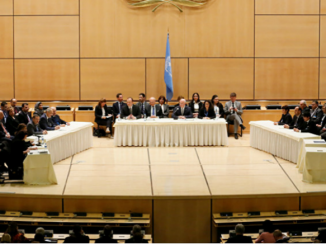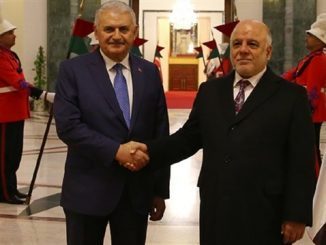
More than 700,000 people have been displaced from Idlib governorate, northwestern Syria, over the past eight months as a result of the fighting between Syrian regime forces and opposition groups in the area.
UN Deputy Regional Humanitarian Coordinator for the Syria crisis, Mark Cutts, said in a statement on Tuesday that the humanitarian situation in Idlib is alarming where more than three million civilians “remain trapped in a war zone; the vast majority of them women and children”.
Cutts explained that 1,300 civilians had died as a result of air strikes and shelling in Idlib governorate between May and August of 2019 while more than 300,000 civilians have been displaced from their homes in southern Idlib since mid-December 2019.
Cutts said the civilians’ suffering had increased after nearly 13 medical facilities were forced to suspend their operations in the area due to the deteriorating security situation, pointing to the destruction of educational and health facilities.
“On Sunday, we received reports of at least nine civilians killed and 20 others injured in Ariha, following air strikes in the area,” he said.
Cutts cited humanitarian staff on the ground as saying that the air strikes resulted in destruction and damage to buildings, including a school, a kindergarten and a mosque.
Meanwhile, the Syria Response Coordinators Team said they have documented the displacement of more than 55,664 families which include 328,818 people from southern and eastern Idlib areas during the period from early November 2019 to 3 January 2020.
UN sends 68 aid trucks to Syria’s Idlib
The United Nations on Tuesday dispatched 68 trucks of humanitarian aid to the Syrian province of Idlib, according to Anadolu Agency.
The agency said the aid convoy passed through Turkey’s Cilvegozu border crossing, in the southern Hatay province, and Syria’s Bab Al-Hawa. The aid will be distributed to those in need in Idlib and its surrounding areas.
The Syrian regime, Russia and Iranian-backed foreign groups have been attacking Idlib, the last opposition stronghold in the country .
Hundreds of civilians fled the province towards the Turkish borders.
In 2017, Turkey, Russia and Iran reached an agreement designating Idlib a “de-escalation zone”, however the regime and its allies have been shelling the area in an effort to recapture it.
Erdogan: Up to 250,000 Syrians fled toward Turkey as crisis worsens
Early January 2020, Turkish President Tayyip Erdogan said up to 250,000 migrants were fleeing toward Turkey from Syria’s northwest Idlib region after weeks of renewed bombardment by Russian and Syrian government forces.
Turkey already hosts some 3.7 million Syrian refugees, the largest refugee population in the world, and Erdogan said it was taking steps with some difficulty to prevent another wave from crossing its border.
With winter worsening an escalating crisis, the United Nations has said some 284,000 people had fled their homes as of Monday. Up to 3 million people live in Idlib, the last rebel-held swathe of territory after Syria’s nearly nine year civil war.
“Right now, 200,000 to 250,000 migrants are moving toward our borders,” Erdogan told a conference in Ankara. “We are trying to prevent them with some measures, but it’s not easy. It’s difficult, they are humans too.”
Towns and villages have been pounded by Russian jets and Syrian artillery since a renewed government assault last month, despite a deal agreed last September by the leaders of Turkey, Russia and Iran to ease tensions.
At least eight people, including five children, were killed on Wednesday in on Idlib town when the Syrian army launched missiles that struck a shelter for displaced families, witnesses and residents said.
In a report, the United Nations Office for the Coordination of Humanitarian Affairs (OCHA) said the city of Maarat al-Numan and the surrounding countryside “are reportedly almost empty.”
“Displacement during winter is further exacerbating the vulnerability of those affected. Many who fled are in urgent need of humanitarian support, particularly shelter, food, health, non-food and winterization assistance,” the OCHA said.
It said those displaced in December were fleeing toward Turkey, other parts of northern Idlib or toward other areas in northern Syria such as Afrin and al-Bab that Turkey seized in previous cross-border military operations.
Syrian President Bashar al-Assad, backed by Russia and Iran, has vowed to recapture Idlib. Turkey has for years backed Syrian rebels fighting to oust Assad.
Erdogan said last month his country could not handle a fresh wave of migrants from Syria, warning Europe that it will feel the impact of such an influx if the bombing is not stopped.
Moscow and Damascus both deny allegations of indiscriminate bombing of civilian areas and say they are fighting al Qaeda-inspired Islamist militants. However, their advances also pile pressure on Turkey, which has 12 military posts in the area.
Earlier, Turkish Defence Minister Hulusi Akar said it was out of the question for Turkey to evacuate its observation posts in Idlib.



